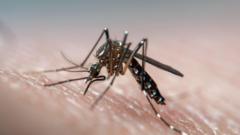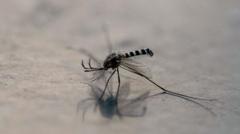Scientists from the University of California, Irvine have introduced a novel approach to combat mosquito-borne diseases such as dengue fever, yellow fever, and Zika by making male mosquitoes deaf. This unique strategy aims to limit the reproduction rates of mosquitoes, which are responsible for spreading these viruses to around 400 million people annually.
The research focused on the Aedes aegypti species, known for their role in transmitting diseases. Male mosquitoes typically rely on sound to locate females during flight, as they are attracted to the distinctive wingbeats produced by females. By altering a specific genetic pathway responsible for hearing, the researchers were able to prevent these deafened males from successfully mating with females, even after being housed together for three days.
The genetic modification targeted a critical protein, trpVa, which is essential for sound detection in these insects. Experiments showed that the neurons in the modified mosquitoes did not react to the mating sounds that normally draw them to females. Hence, while wild males actively copulated and fertilized nearly all females in their vicinity, the mutated males exhibited no mating behavior whatsoever.
Dr. Joerg Albert, an expert on mosquito reproductive behavior from the University of Oldenburg, commented on the findings, noting that while the research presents a promising avenue for mosquito control, it necessitates further study and careful management. He underscored that without sound, male mosquitoes may struggle to locate females, which could potentially lead to diminished populations.
In addition to this innovative genetic approach, other strategies, such as releasing sterile males into specific regions plagued by mosquito-borne diseases, are also being pursued. While mosquitoes may be harmful as disease carriers, they play a vital role in the ecosystem—serving as food for various animals and as pollinators for certain plant species.






